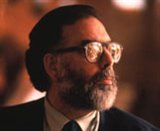- Home
- Francis Ford Coppola
Francis Ford Coppola

FRANCIS FORD COPPOLA
Date of Birth: April 7, 1939
Although born in Detroit, Coppola grew up in New York with his Italian-American composer father and actress mother. As a young boy he created a number of 8mm features edited from home movies. Trained for a career in music, he had won a tuba scholarship to the New York Military Academy, but chose university instead.
From 1956 to 1960, he attended Hofstra University in Hempstead, New York where he majored in theater arts and directed a number of stage plays including A Streetcar Named Desire and Inertia. His stage work earned him three D.H. Lawrence Awards for theatrical direction. In 1960, Coppola entered UCLA film school, which eventually led to a Masters Degree. Learning both in the classroom and in the field, Coppola's years at UCLA were highly productive, though his credits might be called dubious by some: he worked in various capacities on several soft-core porn films as well as other projects.
After university, Coppola worked on a number of scripts with other writers. One of them was Patton, for which he shared an Oscar for Best Adapted Screenplay. With backing from Warners, Coppola was able to establish his own production facility, American Zoetrope, with George Lucas in 1969.
The year 1972 saw Coppola enter the Hollywood spotlight with his directorial work on the classic film The Godfather. Not only did it became one of the highest-grossing movies in history, it brought him an Oscar for writing the screenplay with Mario Puzo. The film also won an Oscar for Best Picture, and earned Coppola a Best Director Oscar nomination. He followed up by producing the hit American Graffiti, and directed The Conversation and Godfather II—brilliant films that deserved and won countless awards.
In 1979 Coppola came out with another blockbuster, but not without difficulty. Apocalypse Now was wildly over-budget, had long-delays and was catastrophe-prone. Loosely based on Joseph Conrad's Heart of Darkness, the film tracks a CIA operative who travels up a Cambodian river during the Vietnam War. In the end the film enjoyed an emotional premiere at the Cannes Film Festival, where it won the Palme d'Or. A year later, the film took two Oscars.
The next 11 years found Coppola in a slump. Films like One from the Heart (1982), The Outsiders (1983), Rumble Fish (1983), The Cotton Club (1984), and Captain Eo (1986) were all box-office disappointments. By the mid-'80s his production company, which was mortgaged to the brim, went belly up. Although Peggy Sue Got Married was great fun and Tucker: A Man and His Dream was a visual treat, the films weren't enough to regain the luster of Coppola's seventies triumphs.
In 1989, Coppola directed the "Life Without Zoe" segment (co-written by his daughter Sofia) of New York Stories and received the weakest reviews of the three participating directors. Throughout his career, shaky business ventures have magnified the problems of Coppola's box-office flops. He has become famous for hiring as many members of his family as possible to work on his projects. Some, like musician father Carmine, did fine work. Others, like his daughter, Sofia—a last-minute replacement for an ailing Winona Ryder in Godfather III—did not.
The '90s brought kinder results for his films, both directed and produced. Dracula (1992), The Secret Garden (1993), Frankenstein (1994), Jack (1996), The Virgin Suicides (1999), Sleepy Hollow (1999) and the television show, Dark Angel all received positive reactions from critics and viewers alike.
Though his film career has had both excellent and poor results, Coppola has become one of America's most erratic, energetic and controversial filmmakers.
Filmography (director):
Tetro (2009)Youth Without Youth (2007)
Supernova (2000) (uncredited)
The Rainmaker (1997)
Jack (1996)
The Godfather Trilogy: 1901-1980 (1992)(V)
Dracula (1992)
The Godfather: Part III (1990)
New York Stories (1989) (segment 2)
Tucker: The Man and His Dream (1988)
Gardens of Stone (1987)
Captain Eo (1986)
Peggy Sue Got Married (1986)
The Cotton Club (1984)
Rumble Fish (1983)
The Outsiders (1983)
One from the Heart (1982)
Apocalypse Now (1979)
The Conversation (1974)
The Godfather: Part II (1974)
The Godfather (1972)
The Rain People (1969)
Finian's Rainbow (1968)
You're a Big Boy Now (1966)
Dementia 13 (1963)
The Terror (1963) (uncredited)
The Playgirls and the Bellboy (1962)
Tonight for Sure (1961)
Nebo sovyot (1960)